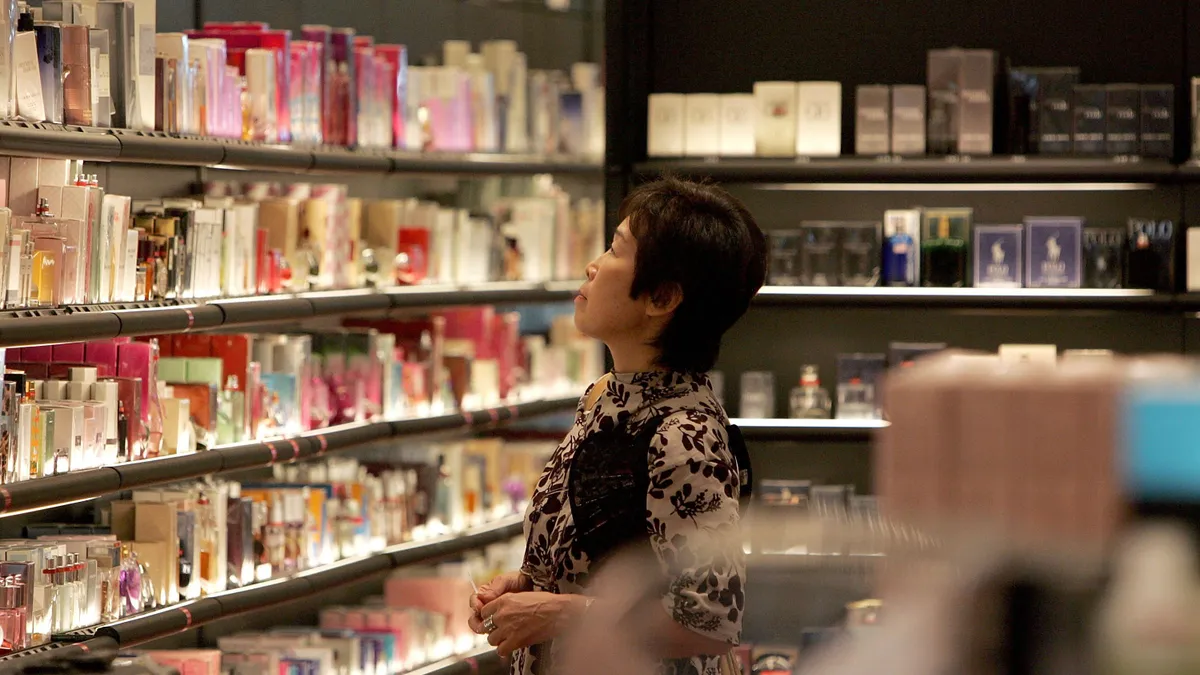Beauty startup Birchbox made what seemed like an unusual move in October last year when it agreed to an acquisition by healthcare firm FemTec Health. With the switch, Birchbox relaunched its beauty subscription service with an emphasis on personalized skin and healthcare products, a decidedly more wellness-focused approach.
Now, the company's website touts "science-rooted custom curation for your skin," along with hair and skin repair kits. Birchbox founder Katia Beauchamp told Retail Dive at the time that the offerings would also include ingestible beauty and topical beauty.
"We're not trying to leave beauty at all, but we're trying to reimagine the potential of thinking about beauty," Beauchamp said. "We want there to be a sense that this is about efficacy. This is about really improving your health and your wellness."
Parent company FemTec's broader aim is to help women understand wellness, and Birchbox is just one way to do that. The company's Chief Scientific Officer Kim Capone summarized why a beauty company was a good way to approach healthcare topics by saying simply that, "the healthcare industry does not understand women as well as the beauty care industry does."
The definition of wellness has also expanded over the years to include not just physical wellness, but mental wellness.
"Mental wellness actually opens it up very widely because technically mental wellness could be a cupcake," Larissa Jensen, vice president and beauty industry adviser at the NPD Group, said. She credits the pandemic with bringing mental wellness front and center, and opening up more opportunities for beauty retailers as a result. "All of beauty technically could fall under wellness. Yes, skincare is a big piece of that from a physical product standpoint. But you could also think of fragrance as wellness. It gives a boost to your mood, it lifts your spirit, right?"
More and more, the worlds of healthcare and beauty are colliding — and retailers are taking advantage of the convergence.
Creating 'a single entry point into a beautiful healthcare world'
Hims & Hers has followed the opposite trajectory of Birchbox, expanding from healthcare into more beauty categories over time. The company launched a men's concealer in 2021 and debuted anti-aging and acne products to complement its skincare assortment. Hims & Hers also tackles hair loss and has made partnerships with several retailers to sell its haircare products, including The Vitamin Shoppe and Walmart. (A selection of the company's products are featured in other retailers as well, ranging from Urban Outfitters to Walgreens.)
That's all in addition to the company's assortment of sexual wellness products and supplements, the latter of which just expanded to include three new mental wellness supplements. Taken together, the products are a mix of prescription offerings and over-the-counter items, many attempting to solve for specific customer needs.
In November, Hims & Hers debuted a mobile app and launched a "member store" that allows customers to shop its products in one place, its own vision of wellness.
"From supplements to support sleep, to products tackling hair loss, the member store allows for curated and personalized offerings bundled for easy access to uplevel daily routines or enhance current plans," CEO Andrew Dudum said in the retailer's Q3 earnings, according to a Seeking Alpha transcript. "While still early, we believe that what we are building envisions a new future in healthcare, a single entry point into a beautiful healthcare world, simplifying the complexity of feeling great and being well."
The categories have become so intertwined that Piper Sandler created a new vertical in its consumer coverage that "blends together health and self-care," the firm's Senior Research Analyst of Beauty and Wellness, Korinne Wolfmeyer, wrote in a note announcing the transition. All told, Wolfmeyer estimates the market size is $650 billion globally and $170 billion in the U.S. alone. That includes beauty products, the medspa market, and vitamins and minerals.
"Everyone's searching for the fountain of youth. If you can substantiate your claims, people will be into it."

Lauren Bitar
Head of Insights at RetailNext
"The pandemic brought to light a new perspective on beauty, with self-care seeing growing prioritization as well as the importance of using products that have real, proven, and effective results," Wolfmeyer wrote in late January.
Falling in line with that trend, NPD's Jensen found that clinical brands are the No. 1 brand type in skincare currently, for the second year in a row. Look at the earnings calls of beauty giants like L'Oréal and Estée Lauder and references to efficacy and clinically-proven products can be found throughout.
Estée Lauder CEO Fabrizio Freda in November praised Clinique's "smart clinical repair wrinkle correcting serum," which is built off of "powerful clinically led claims" as a sign of Clinique's innovation and relevance. That was just a quarter after the company closed its acquisition of Deciem, touting its "science-driven" brands. Deciem has an in-house team of biochemists leading innovation.
Likewise, L'Oreal in its 2020 annual report emphasized its brands' focus on "science" and "natural yet highly effective skincare." The company accelerated those efforts by acquiring Japanese clinical skincare brand Takami and U.S.-based Thayers, which sits "at the intersection of nature and health."
"The fifth COVID-generated trend is the return of science and tech on the center stage as the solution to the world's issues," now-CEO Nicolas Hieronimus said in February last year. "We are a science-based company."
Wolfmeyer sees science-backed products as one of the major pillars continuing to drive the beauty and wellness space in 2022, and another one as the use of more sustainable and healthy ingredients. All of that is a sign of continued, and growing, overlap between beauty and healthcare.
In that sense, a greater emphasis by beauty retailers on wellness as a category that encompasses both skincare and supplements makes sense. Lauren Bitar, head of insights at RetailNext, said the idea of "beauty from the inside out" is already seeing early success, so pitching supplements as just another step in a daily beauty routine could work to position companies as lifestyle brands.
The marketing of some healthcare brands has already shifted to mirror the more lifestyle positioning of beauty brands, featuring clean and colorful aesthetics, and in Hims & Hers' case, advertising itself as "healthcare that feels like self-care."
"There's going to have to be some marketing around like, 'it's just part of your beauty ritual,'" Bitar said. "If it's traditionally a beauty company, you're going to have to show some scientific prowess behind your claim to take these pills — there's already a cocktail of things that people are taking — to get them even to switch. I don't think everybody's going to do that super well, but I think if you can do that, everyone's searching for the fountain of youth. If you can substantiate your claims, people will be into it."
Wellness as the 'expanded view of beauty'
Healthcare firms extending further into beauty is only half of the story around wellness. Wellness can mean any variety of things to a customer, and plenty of them lie outside the realm of science-backed products aimed at improving health. Take Ulta for example: The retailer last year launched "The Wellness Shop" in stores and online as part of its effort to adopt an "expanded view of beauty."
According to CEO Dave Kimbell, 65% of beauty enthusiasts (Ulta's target customers) believe beauty is significantly connected to wellness. Kimbell said in August that customers were "responding well" to the wellness shop and the retailer planned to increase the assortment over time.
The shop advertises itself as "self-care for the mind, body and spirit" and focuses on five key areas: everyday care, supplements and ingestibles, relax and renew, down there care and spa at home. Products range from body oil and collagen boosters to bath bombs, tampons, a sleep therapy machine and candles.
"All of Ulta's website could be wellness just from the perspective of: 'I will buy these products because it makes me feel good about myself,'" Jensen said. "That's one of the things that really separates beauty from many categories and actually helps us to maintain some sort of resilience is that's what we do: We bring joy to the consumer. We give her self-confidence through our products."
At different times in 2021, Ulta executives defined the wellness and self-care category as inclusive of: body care and hydration, fragrance and bath, skincare, sun protection, scalp care routines and sleep regimens. To give a further sense of its broad definition, Sephora's wellness site features facial rollers alongside a reusable glass straw set.
"This is where beauty has their moment."

Larissa Jensen
Vice President and Beauty Industry Adviser with the NPD Group
The beauty and wellness category as a whole has accelerated thanks to the pandemic, which has changed consumer behavior and given people more time to spend on themselves, according to Wolfmeyer. Skincare got a boost from mask-wearing and the "skinification" of other categories is also underway, which entails combining the benefits of skincare into makeup, haircare and other areas.
"[W]e've seen over the past few years that with lockdowns and lack of travel and in person entertainment, there was a surplus of disposable income that started to be applied to spending on oneself and personal care," Wolfmeyer said. "We've seen brands that offer these types of products (body care, fragrances, supplements, etc.) not only be resilient throughout the pandemic but actually accelerate. Importantly, the pandemic is not where this ends, and we think the next generations (millennials, Gen Z) exude these self-worth characteristics that should keep the momentum going for years to come."
Fragrance is another example of a category currently "on fire" as self-care and wellness take over the beauty space. Jensen said fragrance is growing double digits over 2020 and 2019, and a survey of consumers suggested many of those purchases were made by shoppers looking to treat themselves. Estée Lauder's Freda in November echoed those thoughts, noting "outstanding performance" in some of its fragrance markets and adding that self-care rituals tied to scent have continued even with waning pandemic impacts.
"I feel like this is where beauty has their moment," Jensen said, "because I think beauty as a whole can ride that wave of this expanded definition of wellness."






















